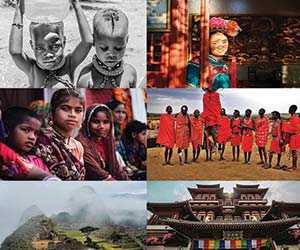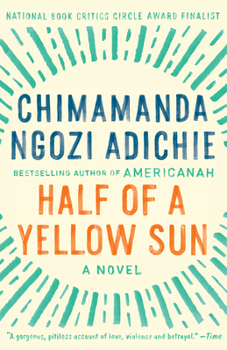Half of a Yellow Sun
Select Format
Select Condition 
Book Overview
NATIONAL BOOK CRITICS CIRCLE AWARD FINALIST - From the award-winning, bestselling author of Americanah and We Should All Be Feminists--a haunting story of love and war. - Recipient of the Women's... This description may be from another edition of this product.
Format:Paperback
Language:English
ISBN:0676978134
ISBN13:9780676978131
Release Date:September 2007
Publisher:Vintage Books Canada
Length:560 Pages
Weight:0.05 lbs.
Dimensions:0.9" x 5.1" x 8.0"
Related Subjects
Contemporary Fiction Genre Fiction Literary Literature & Fiction Political World LiteratureCustomer Reviews
5 ratings
BEAUTIFULLY RENDERED NOVEL
Published by Thriftbooks.com User , 15 years ago
This beautifully rendered novel by Chimamanda Ngozi Adichie describes to us in breathtaking details the polarizing 1960s of Nigeria. As with Purple Hibiscus Purple Hibiscus: A Novel Chimamanda Ngozi Adichie proves yet again that her voice is not one that is easily silenced. The centers around twin sisters, Olanna and Kainene, who, along with their family, get encompassed by civil war. All I really need to say is I couldn't put this book down! From the first sentence to long after I completed it, this book stayed with me. Some call this book a love story, others it's a fictional tale based on non-fictional events, but it really is about people enduring through some of the hardest times imagined. The honesty in the language, the way Chimamanda Ngozi Adichie created the dialog, all culminate to create this haunting tale. A+
Compelling and Honest
Published by Thriftbooks.com User , 17 years ago
I could not put this book down! The story grabbed hold of me immediately and soon I was living in the lives of the main characters. There are many ways to look at this book: it is a love story; a history; about African culture; about starvation; a war story; a book about families and loyalty; it is about facing fatal horror and trying to find meaning; it is literature; and it is a keeper. The plot cannot be condensed into one theme or story. It is about loving someone with whom you have real and painful differences, the heartache, companionship, and ultimately, acceptance of each other and of the love that you have. It is about how disparate members of a family cope with plenty and with poverty. It takes you into the war for Biafra and the details are harsh, stark, and they make you pause. Adichie presents us with an honest story; there are no happy endings; many compromises. This is the beauty of the story - it is honest, real, lyrically relentless in depicting a point in time that was a shame of a nation; of a world. Adichie's novel will haunt you and it will stand the test of time.
History is people
Published by Thriftbooks.com User , 17 years ago
Most of us will have little knowledge of the Biafra war, except, possibly, for the media's haunting images of starving children. Chimamanda Ngozi Adichie brings her people's world to us in this beautifully crafted, deeply moving, novel. Set in Nigeria during the 1960s, the narrative alternates between the optimistic early years of the decade and the civil war period at the end of it. With her extraordinary storytelling skill, Adichie draws the reader into an absorbing account of fictionalized realities that is impossible to put down - or to forget after the last page is read. With this, her second novel, she confirms her international reputation, established first with Purple Hibiscus, as one of the leading new voices of African literature. While the war for Biafra's independence, born out of highly complex Nigerian and international political circumstances, provides the essential context for the novel, Adichie's focus is on the personal and private, the struggle of the civilian Igbo population. Her depiction of the horrors of war, the starvation and destruction is realistic. Yet she does not allow these scenes to take over and succeeds in not overwhelming the reader with them. By concentrating on one family and its close circle of friends and neighbours, Adichie creates an intimate portrait of these people's lives during both these critical periods. She paints her characters and their ongoing interactions against the panoramic view of events and environments that influence their lives and challenges their peace and even their existence. Central to her story are the twin sisters, Olanna and Kainene, from a wealthy middleclass Igbo family. The beautiful Olanna leaves Lagos for a university environment to be with her political firebrand lover, the math professor Odenigbo. Kainene, on the other hand, having inherited their father's talents, shines as a confident business woman. English researcher and writer, Richard, friend of Odenigbo, falls under her spell. Adichie explores the interactions sisterly intimacy and love as well as its serious tests with sensitivity and empathy for both. Through them and their surroundings she also touches on the social, political and religious tensions of the time. The list of main characters wouldn't be complete without Ugwu. Brought into the Odenigbo household as a house boy, he matures from the naive village boy to become a well educated, articulate and caring member of the extended family. In fact, Ugwu acts as a sort of understudy to the narrator, adding a very distinctly personal flair to the description of events and bridging the reality of his own family's rural environment with that of the intellectually stimulating social gatherings at the professor's house. During the war years, intimacies, friendships and loyalties are put to the test. Will they survive the dramatically changed circumstances that the group finds itself in? Some are evicted from their homes and have to join the endless stream o
Worth its weight in gold!
Published by Thriftbooks.com User , 17 years ago
I have just finished reading Half of a Yellow Sun, the second novel by highly-acclaimed young Nigerian writer, Chimamanda Ngozi Adichie. I have to agree with critics that with this novel, Adichie has confirmed, if need be that, that she is one of the best writers of her generation, and that she is indeed "the 21st-century daughter of Chinua Achebe," as the Washington Post enthused in a review of her debut novel Purple Hibiscus. Set in Nigeria before and during the secession of Biafra, Half of a Yellow Sun revolves around five very different characters; Thirteen-year old Ugwu, the fiercely loyal houseboy to Odenigbo, a revolutionary professor at the University of Nsukka and an unapologetic Biafran nationalist; the compassionate and sensitive Olanna, daughter of a wealthy Igbo businessman, who abandons the nouveau-riche lifestyle of post-independence Lagos for a more sedate, intellectual and passionate life in Nsukka with her lover Odenigbo; Richard, a pro-Biafran British idealist who has a passion for Igbo traditional art and is in love with Olanna's twin sister, the placid, distant and enigmatic Kainene. The lives of these characters is masterfully woven into the events of that tumultuous decade in Nigeria's history which was marked by the first military coups in the country's history, the anti-Igbo pogroms in Northern Nigeria, the Biafran secession, and the ensuing civil war. Although the Biafran secession and civil war serve as a backdrop to the novel, Half of a Yellow Sun is not a history of those events. Neither is it a classic war novel. Although the Biafran story is ever-present in the novel, it does not intrude, distort, or overwhelm the central story. Even when the characters are caught in the maelstrom of war, it is still their individual stories that are at the forefront. This is a story of love, betrayal, infidelity, forgiveness, hope, loss, grief, survival, resilience and broken dreams. As we get to know the principal characters, we cannot stop ourselves from bonding with them - even in their most flawed moments - and wistfully hoping that their dreams would come true. Alas! This is fiction which solidly anchored in history - immutable history. So we know how the outcome of the civil war; the Land of the Rising Sun shall never come to be; the half of the yellow sun (emblem on the Biafran flag) will never grow full-blown, but will wither under the unrelenting attack of federal forces. Nonetheless, we hungrily read on because we desperately want to know whether our protagonists make it out of the war unscathed, and whether their relationships survive the war. With Half of a Yellow Sun, Adichie has delivered a compelling book on love and war, on family and friendship, and on ethnicity and national identity. In this regard, the Los Angeles Times review is right on the mark when it observes that: "...with searching insight, compassion and an unexpected yet utterly appropriate touch of wit, Adichie has created an extraordinary boo
vivid condemnation of war
Published by Thriftbooks.com User , 17 years ago
In the late 1960s civil war devastates the Igbo people who formed the independent nation of Biafra having broken away from Nigeria. Thirteen year old peasant Ugwu has survived so far even being forcfully conscripted into the shabby Biafran army; currently he works as a houseboy for Professor Odenigbo. At the same time the lad endures life and death, a savage slaughter of the affluent leaves twin sisters Olanna and Kainene without any other family member left alive. Both choose similar paths to safety; the only ones available to young orphaned females. Olanna becomes mistress to Professor Odenigbo, who loathes the Europeans for what their occupation has wrought to his homeland; Kainene, on the other hands, selects British writer Richard, who is writing a book on the civil war impact on the Igbo, as her protector. Ugwu and Kainene form a relationship, but she becomes outraged when he spends a drunken night with her twin, putting all three at risk. Readers will feel and "see" the impact of war on the innocent in this superior historical novel. Using the Biafra civil war of the 1960s as the influence that directly impacts her three prime characters and to a lesser degree the two support players, Chimamanda Ngozi Adichie paints a vivid condemnation of war in which peasants below the frey easily become collateral damage and survivability is everything. Readers (except VP Cheney, who would find a connection to 9/11) will appreciate this powerful look at real world surviving. Harriet Klausner
Half of a Yellow Sun Mentions in Our Blog

Reading Challenge: Reading About Different Cultures
Published by Bianca Smith • March 08, 2018
Living different lives, in the pages of books.





